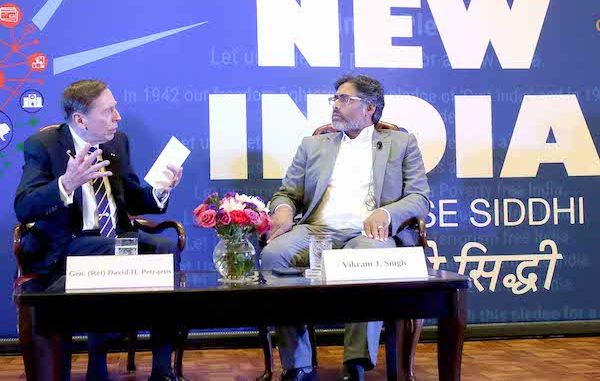
NEW YORK(TIP): A day after Pakistan Prime Minister Imran Khan claimed his country’s spy agency ISI provided information that helped the US track down and kill Osama bin Laden, former Director of the Central Intelligence Agency (CIA) General David Petraeus said he is “convinced” that the Pakistani intelligence did not know the Al-Qaeda chief was in Pakistan, even as he asserted that terror groups such as the Tehrik-e-Taliban Pakistan and other “internal extremists” are the real “existential threat” for Pakistan and are a “very diabolically difficult problem to deal with”.
“The challenge for Pakistan, of course, is that the existential threat is not the country to its east, it is not India. It is the internal extremists. It is a very diabolically difficult problem to deal with,” Petraeus said Tuesday during an interactive session at the Indian Consulate, following his address on the topic of the Indo-Pacific.
Petraeus, a partner in the international investment firm KKR and Chairman of the KKR Global Institute, was the special guest for the ‘New India Lecture’ series organized by the Consulate General of India, New York in partnership with the US India Strategic Partnership Forum.
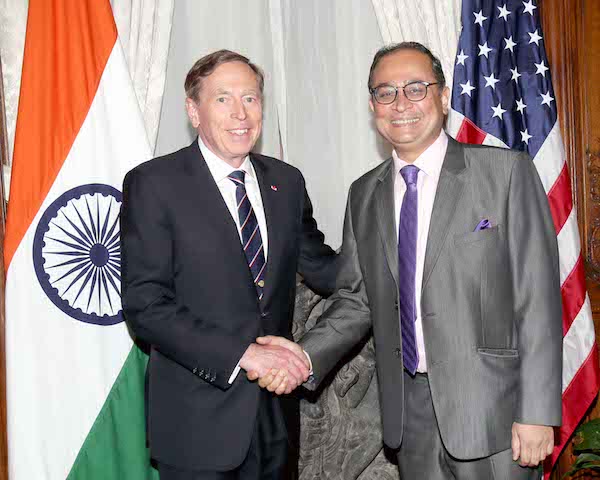
Photo / Jay Mandal-On Assignment
Responding to a question on US-Pakistan relationship, Petraeus said he has experienced the bilateral ties “on a very first hand basis” as the Commander of the US Central Command around the year 2009 and there have been some “positive” as well as “disappointing and frustrating periods” in ties between Washington and Islamabad. He added that the US has always provided “enormous” support to Pakistan, recalling that he and former special adviser on Pakistan and Afghanistan Richard Holbrooke went to the US Congress and got 7.5 billion dollars for economic assistance for Pakistan over a five year period, which was in addition to the two billion dollars already extended in various categories of defense assistance and counter-terrorism support. “At the end of the day, of course there was a degree of disappointment,” he said.
On a question from Prof. Indrajit S Saluja, editor of The Indian Panorama, about slain Al Qaeda leader Osama bin Laden living in Pakistan before he was killed, Petraeus asserted the US is convinced that the Pakistani intelligence was not aware that the terrorist leader was hiding in their country.
“We are quite convinced that the ISI, Pakistani intelligence, no one else knew that he (bin Laden) was there (in Pakistan). They were not harboring him or hiding him or anything like that. We have very good insights on that. We probably differ with those who said that the Pakistanis were allowing him to live in that particular compound” in Abbottabad.
Petraeus’s assertion runs counter to claims made by Pakistan’s Prime Minister Imran Khan that Pakistan’s powerful spy agency ISI provided information to the CIA which helped the US track down and kill the al-Qaeda chief. Khan’s comments are a significant revelation as Islamabad had so far denied having any knowledge of the terror chief until he was shot dead in 2011. Khan, who is visiting Washington on his maiden official trip, revealed this during an interview with Fox News when he was asked whether his country would release jailed Pakistani surgeon Shakeel Afridi who helped the CIA track down Osama. The Al Qaeda leader was killed in a covert raid by a US Navy SEAL team in Abbottabad, a garrison town north of Islamabad, on May 2, 2011.
“It was ISI that gave the information which led to the location of Osama bin Laden. If you ask CIA it was ISI which gave the initial location through the phone connection,” Khan has said.
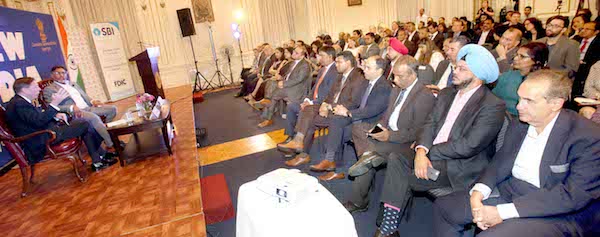
Photo / Jay Mandal-On Assignment
Petraeus said that during counter-insurgency campaigns, Pakistani authorities could never close in on North Waziristan where terror outfits such as the Haqqani network, Al Qaeda and others had their headquarters and some of their forces. He added that the US learnt later on that bin Laden was not in that area but near the Pakistan Military Academy in Abbottabad. “I figured out later that I had probably flown right over his compound in a helicopter as I went to address the cadets at the military academy one time,” he said referring to the Pakistan Military Academy.
Petraeus said he hopes Khan will be able to deal with the challenges of his country, where the economy is “very distorted” and where the “realities of the situation are really quite difficult.”
On Afghanistan, the veteran and decorated US military officer said while the Afghans are fighting and dying for their country, “sadly the momentum of recent years has been against Afghanistan rather than for it. It’s why I have some reservations about the prospects for a peace agreement that we would all support. What adds to my concern is the fact that the Taliban has not even been willing to allow the democratically elected government of Afghanistan to sit at the same negotiating table with them.”
He however expressed hope that President Donald Trump‘s special adviser to Afghanistan Zalmay Khalilzad “can produce magic here and can produce an agreement that would allow us to draw down further, still achieve our objectives and ensure that our Afghan partners are taken care of as well.
“But yet I think it is a very challenging situation,” he said recalling that the US was not able to get a negotiated agreement at a time when he commanded 150,000 coalition forces and “when we had the momentum on the battlefield… so it is a little difficult to see why the Taliban would agree to much more than our departure.”
Petraeus also highlighted that what is more challenging is that the Taliban is just one group of many insurgent and extremist elements operating on Afghan soil. “You also have the Haqqani group. I am not at all confident that they are reconcilable , if some of the elements of the Taliban are. By the way, not all of them would necessarily agree to a peace agreement.” He added that among the other groups operating in the region are the Islamic Movement of Uzbekistan, remnants of Al Qaeda, Islamic State. “And you even have the other Taliban – the Tehrik-e-Taliban Pakistan, the Pakistani Taliban which along with some other groups, I want to contend is the true existential threat to Pakistan, not Pakistan’s neighbor to the east,” again a reference to India.
Further, the challenge has always been putting pressure on an enemy whose senior leaders are “beyond our reach in sanctuaries either in the Federally Administered Tribal Areas or in Balochistan.”
Petraeus said that the biggest lesson that the US has taken from the fight against the Islamic extremists since 9/11 is that “this is a generational struggle. This is not the fight of a decade or a few years. You can defeat this enemy, but you have to keep your eye on it. If you take your eyes off, what happens is that Al Qaeda in Iraq rises back up into the Islamic State, goes into Syria and takes advantage of the Syrian civil war and roars back into Iraq with an army.”
He added that just as the Taliban regrouped in Pakistan after it was destroyed in Afghanistan,it is essential that the pressure is kept on to defeat the terror groups and support the host nations,enabling them to do the frontline fighting, political reconciliation and reconstruction.
“I always remind folks that we went to Afghanistan for a reason and we have stayed for a reason. We went there because the 9/11 attacks were planned in eastern Afghanistan when Al Qaeda had a sanctuary there. We went in to eliminate that sanctuary and we have stayed to ensure that it is not re-established,” he said adding that the challenge now is that it’s not just the Al Qaeda trying to reestablish, it is the Islamic State that also has a “fascination” with this area (eastern Afghanistan).
He noted that the US has been helping the Afghan government and forces, who are fighting very hard and sustaining casualties. “India has helped Afghanistan considerably as well.”
The US is successfully drawing down its forces in Afghanistan, he said adding that another core interest for the US in Afghanistan is that the nation provides a platform from where Washington conducts counter-terrorism campaign in the region. “It is well known that the launch of the operation that killed Osama bin Laden was from a base in eastern Afghanistan.”
(With inputs from PTI)


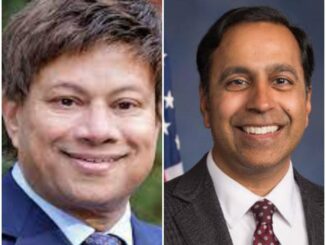
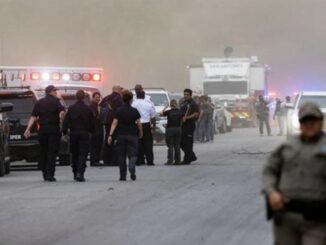

Be the first to comment